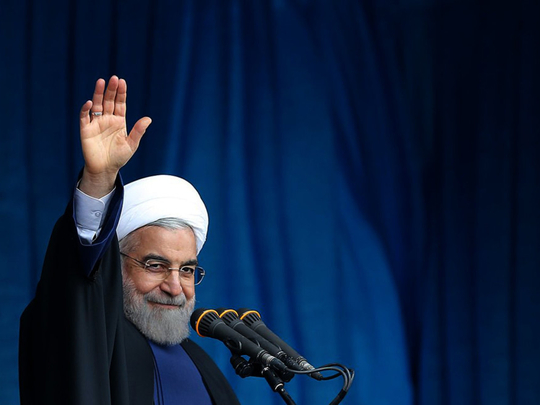
It is not yet a done deal, but there is enough evidence to assume that the meticulous negotiations between Iran and the P5+1 (US, Britain, France, Russia, China + Germany) have finally picked up enough political momentum to enter the last five minutes of the hour. The Gulf Cooperation Council (GCC) capitals have been closely monitoring the progress of the negotiations. They have been constantly briefed on the ups and downs of the negotiations. They got first-hand account from US Sectary of State John Kerry during his visit to Riyadh last week.
But while GCC capitals have kept an eye open on the progress of the technical negotiations, no one knows where the GCC stands on the outcome of the Iran nuclear deal. They are fully aware that Iran’s nuclear deal has profound ramifications for Gulf security and regional politics, but they are yet to go on record to declare a clearly stated position. The nuclear deal is almost one step away, but amazingly no word whatsoever from GCC capitals.
Last week, Israeli Prime Minister Benjamin Netanyahu went all the way to Washington with a mission to kill the Iran nuclear deal and turn the US Congress against US President Barack Obama. He was pointedly furious at Obama and his team negotiating with Tehran. He delivered a blistering speech to the joint session of the Congress, denouncing the deal like no one else has done so far. Unlike the GCC states, he was absolutely clear on where he stood. Netanyahu adamantly opposed any deal, good or bad with Iran. For him, any deal is a bad deal and no deal is probably the best deal. He wanted nothing short of Iran’s total surrender or if he is to have his way, he would prefer the US to launch a military attack to eliminate Iran’s nuclear capability once and for all.
Netanyahu’s position is not just loud and clear, but also rude. However, it comes too late to stop the Iran nuclear deal, which has gained a political momentum of its own. Certainly, no one expects the GCC states to be as vocal as Netanyahu is, who, for a second, pretended to be speaking for the GCC states to the joint session of US Congress.
However, the fact of the matter is that no one knows the real thinking of the GCC on the Iran nuclear issue, which remains purposely vague if not mysterious. Publicly — and unlike Netanyahu — the GCC has always favoured a diplomatic solution to the Iran nuclear programme. War has never been an option to deal with the Iran nuclear issue. They have also made it amply clear that Iran’s controversial nuclear programme is not a regional concern, but an international issue. GCC states have taken a neutral stand on this and said time and again that the issue is best handled by the United Nations, the superpowers and the international community.
In essence, GCC states have been of the opinion that whatever the world community decides it is acceptable to them. They have some modicum of faith in the American negotiators, but they fully trust their European allies to get the best possible deal. The view of the GCC states is that their powerful allies are doing the needed negotiating on their behalf to halt the pending nuclear arms race in the region.
But in the background to all these implicit stands, there have occasionally been voices from the GCC that have repeatedly said that in case the negotiations fail and Iran goes nuclear, they will be forced to match Iran weapon for weapon and dollar for dollar and will not shy away from a nuclear arms race in the Gulf, just as they did not resign to the conventional arms race set in motion by Iran. That would be a nightmare scenario for the GCC states. Luckily, it seems that the worst-case scenario is about to be averted. A nuclear deal with Iran has reached a point of no return. Now what worries the GCC states the most is not the technical details of the deal, but the politics behind it.
Kerry has openly stated during his last visit to Riyadh that Washington was not about to strike a “grand bargain” with Iran. For the Arab Gulf states this is somewhat comforting but it is not good enough. There is this deep concern in the region that a nuclear deal with Iran will legitimise Iran’s regional hegemony, consolidate its political expansionism and allow Tehran to assume the ultimate role of a policeman of the Gulf. It is the inherent political ramifications, not the intricate technical details of the nuclear deal, that is of utmost concern to GCC. Iran is about to accept a 10-year freeze on its nuclear programme provided that the political price is worthwhile. What Iran wants is the easing of the economic sanctions and consolidation of its role of regional hegemony with the full blessings of Obama, who is viewed in various GCC capitals as being soft to Iran and possessing a political agenda of his own.
It is the politics behind the nuclear deal and not the technicalities that is of paramount concern to GCC. The political impact of the nuclear deal can be as profound for the region as the American invasion of Iraq in 2003. It can potentially leave the GCC states once again vulnerable and exposed to Iran’s regional expansionism, which has to be curbed.
Dr Abdulkhaleq Abdulla is a professor of political science. You can follow him on Twitter at www.twitter.com/Abdulkhaleq_UAE








